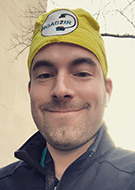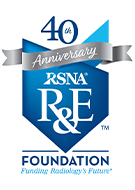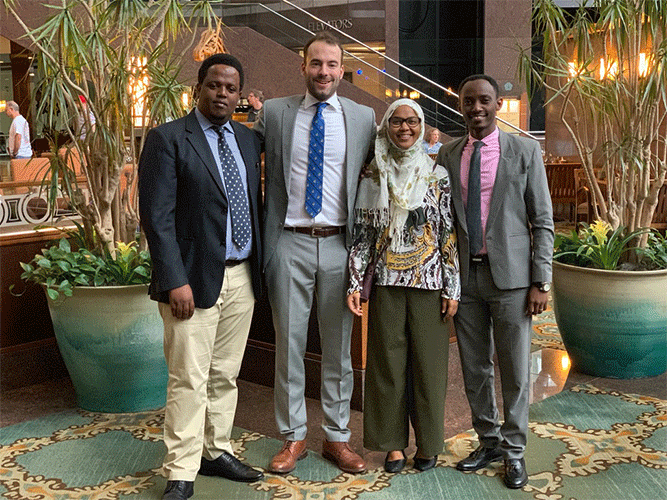Training Interventional Radiologists in East Africa
R&E Foundation grant kickstarts the first IR training programs in the eastern part of the continent


While interventional radiology (IR) has become an essential subspecialty in the U.S., access to minimally invasive image guided procedures is still very rare in most low- to middle-income countries. With support from an RSNA R&E Foundation grant, the nonprofit organization Road2IR is working to train radiologists and expand access to IR procedures in Tanzania, Rwanda, and Uganda.
Despite a population of more than 100 million in those three countries combined, just a few years ago these East African nations had no interventional radiologists. Today, the number is growing quickly because of Road2IR.
Road2IR began in 2018 as a collaboration between several imaging departments, including the Yale Department of Radiology and Biomedical Imaging in New Haven, CT, the Emory University Department of Radiology and Imaging Sciences in Atlanta, and Muhimbili University of Health and Allied Sciences (MUHAS) in Dar es Salaam, Tanzania. The program aims to build self-sustaining IR training programs in East Africa through high-frequency training trips from U.S.-based teams of interventional radiologists, technologists and nurses.
Patients Struggle with Treatable Conditions Due to Lack Of IR
When Road2IR co-founder Fabian Laage Gaupp, MD, assistant professor at Yale University, first visited Tanzania as a 2nd year radiology resident in 2017 with his mentor Dr. Frank Minja, associate professor of radiology at Emory, he was shocked to learn that there was a complete lack of IR procedures in the entire nation, meaning that many lifesaving procedures were not available to patients. This resulted from a dearth of IR training opportunities in the entire region, with the nearest IR training at the time being in Egypt, a five-hour flight from Tanzania.
“The lack of access was startling because we take it for granted here in the U.S.,” Dr. Laage Gaupp said. “Children were dying from readily treatable things like a liver abscess, and a lot of patients were suffering from conditions that interventional radiologists can treat with standard procedures.”
Road2IR focused its initial training on establishing simple procedures such as core needle biopsy, nephrostomy, biliary drain placement and abscess drainage. Over time, more and more procedures were added to the training program, eventually spanning nearly the complete range of procedures offered at large academic centers in the U.S.

Training Program Graduates Begin Working Right Away
The high frequency and continuity of training, with at least ten two-week trips per year, is key to the program’s success, according to Dr. Laage Gaupp. It allows trainees to practice a high number of procedures, be exposed to different faculty with different approaches, better retain their skills, and quickly become experts who can then train others.
In 2021, the first class of three IR fellows graduated from MUHAS, the country’s flagship medical school and the first accredited program in East Africa to offer a Master of Science (MSc) in IR. The first three graduates, Drs. Azza Naif, Ivan Rukundo and Erick Mbuguje co-founded Road2IR together with Drs. Laage Gaupp and Minja, and they are the heart and soul of this entire program, according to Dr. Laage Gaupp.
In 2024, the fourth class will graduate, bringing the number of graduates to sixteen, with twelve remaining in Tanzania, three returning to Nigeria, and one having returned to Rwanda. However, twelve IRs in Tanzania remains well below the goal set by the Society of African Interventional Radiology and Endovascular Therapy (SAFIRE). That goal is to have one IR per one million people, which means at least 60 IRs are needed in Tanzania. Dr. Laage Gaupp said the organization hopes to reach that goal within the decade. Several other nations in the region are even further away from this goal, with many still without a single IR.
“We’ve had a huge positive impact, but there is still so far to go,” Dr. Laage Gaupp said. “I’m optimistic that there is a desire to learn and get these programs up and running, but it requires additional grant funding.”
R&E Foundation Grant Supports the Program
Dr. Laage Gaupp received the 2020 Derek Harwood Nash International Scholar Grant.
“The grant came at a critical time during early COVID and provided an essential boost for this new training program while it was still in an early and fragile state,” Dr. Laage Gaupp said. “This funding was absolutely crucial to the program and without it we likely would’ve not made it through.”
The program spends up to $5,000 in airfare and lodging for each team traveling to East Africa and the unrestricted funding helped support several years’ worth of teams working with Road2IR.
A perpetual challenge for Road2IR is getting the right medical equipment to the region.
While the program has been able to get some imaging and medical equipment to East Africa, disposable equipment remains an issue. Consequently, the visiting teams need to bring medical equipment themselves. When Dr. Laage Gaupp last traveled to East Africa a few months ago, he brought one small carry-on for himself and checked four large bags full of medical equipment including catheters, drains, biopsy guns and guide wires.
At this point, Dr. Laage Gaupp said the program in Tanzania is mostly independent and requires fewer trips, so the organization has shifted its focus to establishing a presence in other parts of East Africa.
The program’s extension in Uganda will graduate its first class of three fellows in 2025 with plans to graduate the first class in Rwanda in 2026.
“I think there is a misconception that IR is too technologically advanced and cannot play a role in Africa, and that is completely wrong,” Dr. Laage Gaupp said. “The need for this type of care is extreme and anything is possible—we have shown it. It’s just a matter of proper allocation of resources.”
For More Information
Learn more about R&E Foundation funding opportunities.
Learn more about Road2IR.
Read previous RSNA News stories about expanding radiology training in Africa:
- RSNA and GE HealthCare Bring Advanced Mammography Technology to Tanzania to Improve Access and Help Address Breast Cancer Mortality Rate
- RSNA Receives $2 Million NNSA Grant to Improve Global Radiology Access
- Development of Several Subspecialty Training Programs Helps Complete RSNA’s Global Learning Center in Tanzania